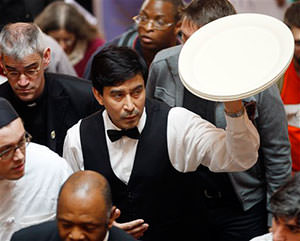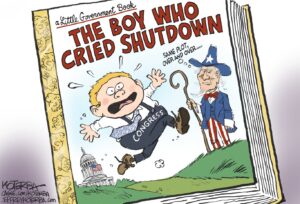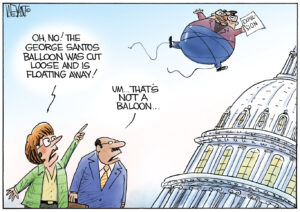With Minimum Wage Bill, Congress Is Just Trying to Keep Up With Inflation
Sen. Tom Harkin, D-Iowa, and Rep. George Miller, D-Calif., said they would like to see the minimum wage hiked even higher than what they have proposed, but "We want it to pass through Congress."Sen. Tom Harkin and Rep. George Miller would like to see the minimum wage hiked higher than they've proposed, but "We want it to pass through Congress."
By Thomas Hedges, Center for Study of Responsive Law
Sen. Tom Harkin, D-Iowa, and Rep. George Miller, D-Calif., held a news conference Tuesday afternoon to announce that they had introduced a bill in Congress to raise the federal minimum wage from the current $7.25 an hour to $10.10 over three years. The legislation would ensure that the minimum wage is indexed so that it would keep up with inflation rates every year.
“Every time we’ve raised the minimum wage,” Harkin said, “the economy gets stronger — every single time.”
The bill “would give a raise to 30 million American workers,” he said. “More than half of these are women and nine out of 10 are adult workers, not teenagers.”
About 120 million Americans make less today than the minimum wage standard in 1968, when workers were making $10.50 an hour adjusting for inflation.
Since 2002, the poverty rate among U.S. children, almost all of who have at least one parent making the minimum wage, has risen from 16 to almost 22 percent.
The current minimum wage “is immoral and it is economically dangerous,” Miller said at the news conference Tuesday. “We know that businesses can afford to raise the minimum wage. The New York Times just yesterday called it the golden age of corporate profits, even while workers’ wages remain stuck in quicksand.”
Harkin noted that “with an increase in minimum, wage workers have more to spend locally and not overseas. This is just basic economics. Increased demand means increased economic activity … [and] a boost to Main Street.”
Harkin and Miller said they would like to see the minimum wage hiked even higher than what they have proposed.
“We have to be realistic though,” Harkin said. “We want it to pass through Congress.”
Opponents of the legislation argue that boosting the minimum wage would push companies to lay off more of their workers. It is the nature, they say, of running a business in a competitive market.
But average CEO pay, Miller pointed out, is 900 percent higher than it was in 1985 and is 360 times the salary of the average — not the lowest paid — worker.
Middle-class income has dropped almost 10 percent over the last 23 years as a result, the congressman said.
Amy Crawford, who traveled from Illinois to Washington, D.C., to speak at the news conference, illustrates today’s minimum wage job holder. For more than 30 years, she worked as a designer and considered herself a member of the middle class. But since moving to Chicago 14 months ago, she has not been able to find commensurate work and now her temporary job at a fast food restaurant is looking more and more permanent.
“I used to think minimum wage jobs were for other people, people who worked where I stopped to get doughnuts or burgers,” the 56-year-old Crawford said. “They weren’t me. They had less education and fewer skills. They didn’t work as hard as I had or try as hard.
“I couldn’t have been more wrong,” she acknowledged. “The truth is that in today’s economy anyone can wind up in a minimum wage job.”
This article was made possible by the Center for Study of Responsive Law.
Your support matters…Independent journalism is under threat and overshadowed by heavily funded mainstream media.
You can help level the playing field. Become a member.
Your tax-deductible contribution keeps us digging beneath the headlines to give you thought-provoking, investigative reporting and analysis that unearths what's really happening- without compromise.
Give today to support our courageous, independent journalists.






You need to be a supporter to comment.
There are currently no responses to this article.
Be the first to respond.